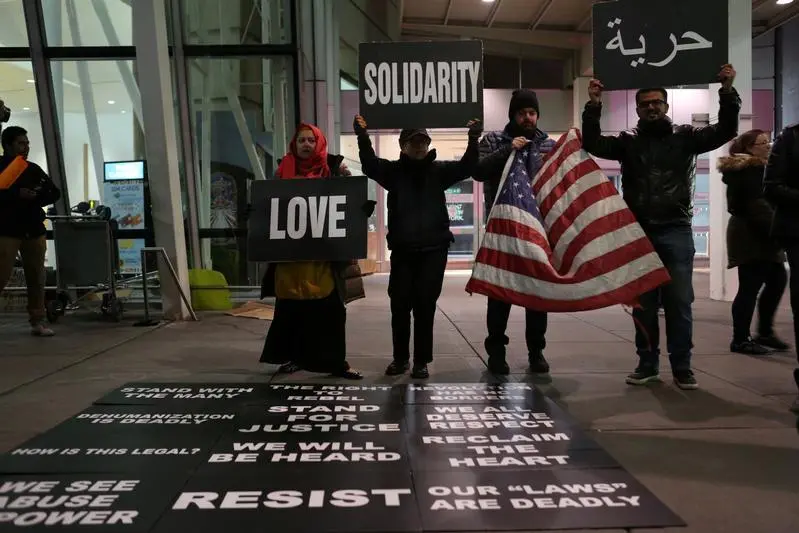PHOTO
NEW YORK - President Donald Trump's announcement on Sunday restricting travelers from an expanded list of countries has already been roundly criticized by immigrant and civil rights groups as no more lawful than his previous travel ban, but it could stand a better chance of holding up in court, legal experts said.
The new presidential proclamation, which Trump said is needed to screen out terrorist or public safety threats, indefinitely restricts travel from Iran, Libya, Syria, Yemen, Somalia, Chad and North Korea. Certain government officials from Venezuela will also be barred.
Trump's Mar. 6 temporary travel ban, which replaced another ban from January and expired on Sunday, targeted six Muslim-majority countries. It sparked international outrage and was quickly blocked by federal courts as unconstitutional discrimination or a violation of immigration law.
In June, the U.S. Supreme Court allowed a limited version of the ban to go ahead while the justices examine its legality.
The proclamation, set to go into effect on Oct. 18, could be less vulnerable to legal attack, scholars and other experts said, because it is the result of a months-long analysis of foreign vetting procedures by U.S. officials. It also might be less easily tied to Trump's campaign-trail statements some courts viewed as biased against Muslims.
"The greater the sense that the policy reflects a considered, expert judgment, the less the temptation (by courts) to second-guess the executive," said Saikrishna Prakash, a professor at the University of Virginia School of Law, in an email. "It looks less like a matter of prejudice or a desire to fulfill a campaign promise."
The government has said the president has broad authority in immigration and national security matters, but challengers to the Mar. 6 ban had argued that it ran afoul of the U.S. Constitution's bar on favoring one religion over another.
They cited statements Trump made during his 2016 campaign for president, including his call for a "total and complete shutdown of Muslims entering the United States."
Within hours of Sunday's proclamation, representatives for the Hawaii, New York and California attorneys general said their offices were reviewing the new restrictions. Advocacy organizations denounced it as more of the same.
"This is still a Muslim ban - they simply added three additional countries," said Becca Heller, director of the International Refugee Assistance Project, which previously sued to block Trump's travel ban executive orders.
"Of those countries, Chad is majority Muslim, travel from North Korea is already basically frozen and the restrictions on Venezuela only affect government officials on certain visas," Heller said.
But the worldwide review, and the new restrictions tailored by country, could weaken such arguments in court.
While the previous ban targeted Muslim-majority nations Iran, Libya, Syria, Yemen, Somalia and Sudan, the restrictions announced on Sunday include North Korea and Venezuela and omits Sudan altogether. It also allows some travelers from Somalia and Iran to enter the U.S.
The review also examined each country's ability to issue reliable electronic passports and share security risk data with the U.S. Overall, 47 countries had problems, and 40 made improvements, including 11 that agreed to share information on known or suspected terrorists, Trump's proclamation said.
The review "at least arguably attenuates the link between the president's alleged bias and the policy," said Margo Schlanger, a University of Michigan Law School professor.
OPENINGS FOR CHALLENGERS
The Supreme Court is scheduled to hear arguments over the original travel ban on Oct. 10, including whether it discriminated against Muslims. Sunday's proclamation could lead the high court to skip deciding the case altogether.
While new claims of religious discrimination might be harder to press, experts said challengers could potentially argue that the expanded ban violates the federal Immigration and Nationality Act, which forbids the government from discriminating based on an individual's nationality when issuing visas. "Congress decided that it didn't want an immigration system that played favorites among countries," Schlanger said.
Jeffrey Gorsky, the former chief of the legal advisory division at the U.S. State Department's Visa Office, said the new ban could be viewed as overly broad in whom it applies to, keeping out all manner of people from those countries "with no evidence of adverse affect on U.S. interests."
(Reporting by Andrew Chung. Additional reporting by Lawrence Hurley in Washington and Dan Levine in San Francisco; Editing by Chizu Nomiyama) ((andrew.chung@thomsonreuters.com; 646.223.8022; 646.407.9441 mobile;))





















